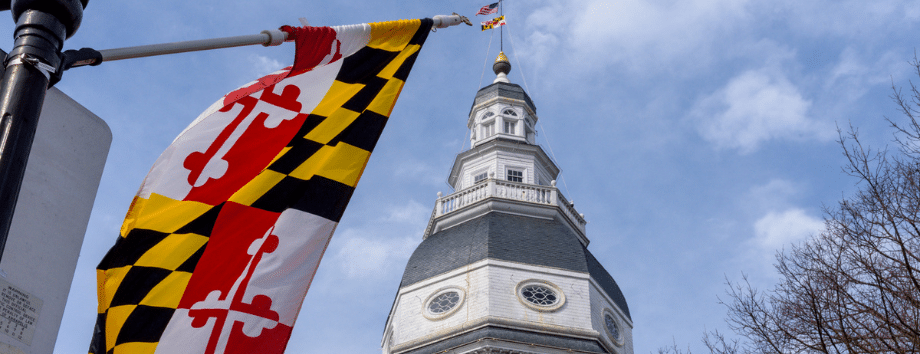Maryland’s Legislative Wins for Disability Rights
April 15, 2024 | Tips and Resources

By Martha Goodman
The 2024 Maryland General Assembly’s 2024 Legislative Session closed on April 8, having achieved a number of groundbreaking accomplishments that will benefit individuals with disabilities and their families. As the Portrait of Jewish Baltimore: 2020 Jewish Community documented, one in three families in our community are facing a significant health condition, special need or disability. Below are some of the most significant bills that were passed and are now on their way to Governor Wes Moore to be signed into law.
Perhaps the most exciting initiative is Senate Bill 797/ House Bill 903, which establishes “access to attorneys, advocates and consultants” for families involved in special education disputes in the IEP (Individualized Education Program) process, creating a $2 million fund by July 2025. There are income limitations for this program – family income cannot exceed 150% of the Maryland Legal Services Corporation guidelines. So, for example, for a family of 5, the income limit would be a little under $120,000. This fund, while it may be used for due process hearings, is primarily designed to address disagreements earlier in the process, with the sponsors hoping for 75% of the funds to be used for this purpose. Across the state of Maryland, special education complaints are on the rise, and parents are at a significant disadvantage when facing off against the school systems. Information about this program will be offered at IEP meetings, as required by this law. SB 797 had several sponsors, including Jewish legislators Baltimore’s Dalya Attar, and Montgomery County’s Aaron Kaufman
Another bill that we believe will have a significant positive impact on the lives of individuals with disabilities is SB 592, which requires information about ABLE accounts (A Better Life Experience) to be shared at IEP and other similar meetings. ABLE accounts are an invaluable tool for keeping individuals with disabilities from living in permanent poverty, due to very low asset limits for government programs, such as SSI. Assets held in ABLE accounts are not counted against that asset limitation. Currently, that limit is only $2000, though advocates are working to have that raised. ABLE accounts in Maryland can provide tax benefits. The use of ABLE accounts is far lower than the number of eligible families; it is hoped that with a broader distribution of information, utilization will increase.
Informational workshops on ABLE accounts and other future planning strategies are frequently hosted by the Macks Jewish Connections Network, as well as other agencies of the Associated. Later this spring, on May 22nd, a Network connector will be hosting such an event. Please contact the Network for information and registration, as well as more information about planning for individuals with disabilities Macks Jewish Connection Network.
Another bill that advocates have long been fighting for, and has now been passed is SB 0092, which requires closed captioning to be provided for each screening of a given movie, and other provisions for movies created with open captions. (The difference between open and closed captions is that open captions are always visible, and closed captions can be turned on or off.)
For years, the Disability and Inclusion department of the Network has been advocating for accessibility for the Jewish Deaf and hard-of-hearing community. The Network administers the Accessibility Fund, providing funding for ASL and voice interpreters for both private and community events, as well as running trainings to teach volunteers to add closed captions to videos. (If you are interested in learning more about captioning, or other accessibility options, please contact the Network.)
Perhaps the most remarkable accomplishment, spearheaded by Dalya Attar with support from several Jewish organizations as well as Senator Shelley Hettleman, is the addition of $500,00 in funding for private school transportation. School transportation for private school students has been a dream for years and will yield great benefits within the Jewish community. Some call it BOOST for bussing. This was an uphill battle, and the challenge remains. Supporters are hopeful that the program and funding will grow with time, as BOOST has. There are approximately 140,000 private school students in Maryland, and the single largest school is Bais Yaakov. The initial pilot program will utilize the MTA system to provide bussing.
Finally, S3744/HB432 brought a critical change to the language of Maryland law, replacing references to mental retardation with references to an intellectual disability in certain provisions of law. These bills are vital follow-up work, parallel to the federal mandate, dubbed Rosa’s law, eliminating the use of the term “mental retardation”, and working towards their passage was a major focus of Jewish Disability Advocacy Day.
We believe that advocacy for accessibility, human rights, and disability support reflects essential Jewish values. This year’s legislative session, with active participation by Jewish legislators, Jewish advocates, and Jewish voters, has yielded significant gains for our community. We invite you to explore voting and advocacy as meaningful expressions of your Jewish life, which have real-world impact in our community.